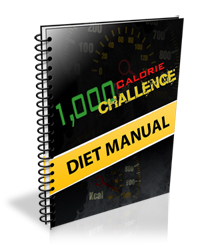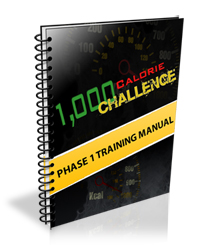 This was a really cool book to review. I was super impressed with the manuscript I got a few weeks ago, and when I got the full version this week, it was ten times better than I thought.
This was a really cool book to review. I was super impressed with the manuscript I got a few weeks ago, and when I got the full version this week, it was ten times better than I thought.
The thing is, I'm a huge fan of systems.
Most people working out are lucky if they are even choosing smart movements for fat loss, much less an actual program that takes them somewhere.
And that's where the 1,000 calorie challenge is really a step ahead – it starts with where you are at, and then it progressively and systematically takes you to a new level of fitness.
There are lots of programs with timed sets and interval based strength training for fat loss these days (which is awesome, it wasn't always like that), what's awesome about the 1,000 calorie challenge is that after you set a baseline, it tells you exactly how to progress from that baseline.
 It actually even takes it a step further than that – you start the program with a fitness test, and based on the results of the test there are four different starting places. Each starting place is tailored exactly to a certain fitness level. That means that whether you are beginner or advanced, you get to start in exactly the right place for you.
It actually even takes it a step further than that – you start the program with a fitness test, and based on the results of the test there are four different starting places. Each starting place is tailored exactly to a certain fitness level. That means that whether you are beginner or advanced, you get to start in exactly the right place for you.
Advanced workout girls and guys may be able to jump right in to 1,000 calorie workouts. Beginner girls and guys might ramp up over four weeks. And I can't stress this enough – having a progressive system to ramp up over four weeks is f*cking amazing.
Having a system that tells you how to progress takes all of the guess work out of working out.
You never have to wonder "Am I making progress?" or "Did I do enough in the gym today" – you'll know, beause you just follow the plan.
Are There Any Downsides?
1.) The first downside, and it's not that big a deal, is that before the workouts, Arnel gets into the science of why it works, and it's a little much. Hormonal response and mobilizing subcutaneous fat and blah blah blah.
If you find yourself getting bogged down in the scientific studies of why to workout like this, just skip ahead to the workouts.
 2.) The biggest downside of this program is just that it's ultra hardcore.
2.) The biggest downside of this program is just that it's ultra hardcore.
It's a little more intense than something I would have a client do year round. This would be the high intensity cycle of your training.
I'm a big fan of treating working out like seasons. Sometimes you're "in season", where you kick ass, break through plateaus and cause something totally new for your body.
And sometimes you're "off season", where you work on form, maybe learn a new skill or take a new class, but basically just maintain.
This would be a serious "in season" workout. This is only for someone who is ready to kick some ass right now.
What Are the Upsides?
It's a really well put together program.
It tells you how to progress. It tells you when to back off. It's a system for working you up to 1,000 calorie burn workouts. How awesome is that?
Now – for the record, I didn't believe 1,000 calorie workouts were really possible until ACE put out that study earlier in the year about kettlebell training burning 20 calories per minute.
GUESS WHAT KINDS OF WORKOUTS THEY USED? Sure obviously they were kettlebell workouts, but they were a progressive, strength training interval system, just like the 1,000 calorie challenge!
 On top of that, it tells you what to eat.
On top of that, it tells you what to eat.
If you got Xtreme Fat Loss (and everyone that did got awesome results) then you're familiar with Joel Marion's diet style – carbohydrate cycling setting up a full on cheat day.
Joel has kicked it up a notch by synching it with the 1,000 calorie workouts to create an even bigger deficit…
…and he's made the system simpler. 
Simpler + More Effective = Most Awesome.
Progressive And Systematic Workout Program
If you aren't using a smart workout program, you aren't even in the game of being rockstar lean.
Maybe you're watching the game. Maybe you don't even know the game is being played.
But if you want to be IN THE GAME, you need a program.
You need to know that program is going to take you some place new. Then you just follow the program.
Josh Hillis, RKC2, CPT, PES, ZMIS
Josh is the author of The Stubborn Seven Pounds.
Josh has been featured in USA Today and the Denver Post, and quoted in the Los Angeles Times
Leave a Reply